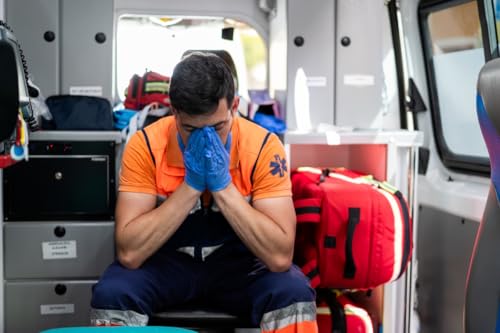
High Anxiety: First Responders
No se pudo agregar al carrito
Solo puedes tener X títulos en el carrito para realizar el pago.
Add to Cart failed.
Por favor prueba de nuevo más tarde
Error al Agregar a Lista de Deseos.
Por favor prueba de nuevo más tarde
Error al eliminar de la lista de deseos.
Por favor prueba de nuevo más tarde
Error al añadir a tu biblioteca
Por favor intenta de nuevo
Error al seguir el podcast
Intenta nuevamente
Error al dejar de seguir el podcast
Intenta nuevamente
-
Narrado por:
-
De:
When Kevin Murphy leads monthly workouts at the Cold Spring firehouse on Main Street, he wants to help firefighters get in shape both physically and mentally.
It's a goal the former Putnam County sheriff's deputy is passionate about since it wasn't long ago that Murphy was overweight and suicidal. Several times, he took out a bottle of pills and a gun and tried to summon the will to pull the trigger.
"I didn't want to die," said Murphy, who leads health and wellness programs for Guardian Revival, the Beacon-based nonprofit that works to improve the mental health and well-being of police officers, firefighters, emergency medical technicians and veterans. "But I wanted the pain to stop. And I figured that the quickest way for that to happen was to kill myself. The pain was intense. It was horrible."
The cause was 22 years of responding to traumatic events as a police officer, first for Putnam County, then for the Carmel, Mahopac and Pleasantville departments.
At most, the average person might witness two or three traumatic events in a lifetime. First responders like Murphy can see 500 or more automobile deaths, suicides, shootings, homicides and other horrors. And they often fail to safely process what they've seen.
"I would just push that traumatic stuff down," said Murphy. "I would just push it down into that bag, and I would push it, push it, push it." His 6-foot-4 frame swelled to 300 pounds. He drank a lot. "It got to the point where I convinced myself that cheap whiskey tasted good because I could afford more of it," he said.
Murphy's bag of repressed trauma started to come apart on the morning of Oct. 1, 2020, while responding to a home in Pleasantville. "It was on Elm Street," Murphy said. "So this was my - and other peoples' - nightmare at Elm Street."
In the front yard, he found an older woman in a white nightgown screaming about her son. "She looked like a ghost," Murphy said.
Inside, Murphy found the man in the dining room, dead with a self-inflicted gunshot wound. On the table was a police shield. He was a 26-year-old police officer.
"I protected myself at the scene by putting myself really deep into work mode," Murphy said. With no sleep, he returned for his midnight shift. "None of my co-workers would have thought any less of me if I took that night off," Murphy said. "But I thought that they would. That's the pressure I put on myself. I completed my paperwork and continued on."
His superiors offered counseling. But he refused because he didn't want to "look weak."
Driving to work six months later, he started crying. "I just had this immense sadness," Murphy said. "It was everything that I was holding up inside. I didn't know that officer, but I didn't mourn his death, you know? I didn't ask for help or say, 'Help me figure this out. Why am I feeling this way?'"
In February 2022, after several suicide attempts, he went to a therapist. "I finally asked for help," said Murphy, who no longer drinks and has lost 60 pounds.
Murphy believes that without the therapy he would have killed himself. "I want people to know that they're not alone," he said. "Our guardians should know they can seek help and receive help and have a productive life and a successful career."
Murphy's story is all too common. In a survey conducted by New York State last year, more than 50 percent of first responders reported symptoms of depression, compared to 20 percent in the general population. About 16 percent said they'd considered suicide in the past year, four times the number in the general population. Eighty percent felt there was a stigma against seeking help.
To address what she called a mental health crisis, Gov. Kathy Hochul this year proposed a scholarship program to train counselors for first res...
Todavía no hay opiniones


